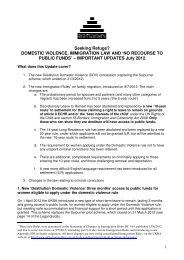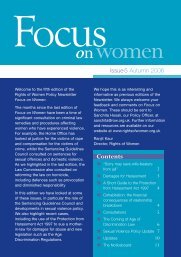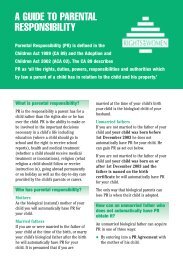Seeking Refuge? - Rights of Women
Seeking Refuge? - Rights of Women
Seeking Refuge? - Rights of Women
Create successful ePaper yourself
Turn your PDF publications into a flip-book with our unique Google optimized e-Paper software.
You will be told when and where your asylum<br />
interview will take place. You must attend your<br />
asylum interview. If you do not, your claim can be<br />
refused because you have failed to cooperate with<br />
an important part <strong>of</strong> the asylum process. If you do<br />
not think that you are medically or emotionally<br />
able to attend your interview, you (and your legal<br />
representative if you have one) can ask for it to be<br />
postponed to a later date. You will need medical<br />
evidence to do this, either from your doctor or a<br />
specialist who has been supporting you. If<br />
something happens on the day <strong>of</strong> your interview<br />
that stops you from attending, you must contact<br />
your legal representative and your case-owner as<br />
soon as possible.<br />
Your legal representative is the person who<br />
advises you on the law and your rights. Your<br />
legal representative may be a solicitor or an<br />
immigration advisor. A solicitor is a qualified<br />
lawyer who is responsible for dealing with the<br />
preparation <strong>of</strong> cases. Some solicitors may also<br />
represent their clients in courts or tribunals.<br />
Solicitors are represented by the Law Society<br />
www.lawsociety.org.uk and are regulated by<br />
the Solicitors Regulation Authority<br />
www.sra.org.uk An immigration advisor is<br />
someone who is not a solicitor but who is able<br />
to give immigration law advice. For<br />
information about immigration advisors<br />
contact the Office <strong>of</strong> the Immigration Services<br />
Commissioner www.oisc.gov.uk<br />
Depending on your financial circumstances<br />
and the merits <strong>of</strong> your case, you may be<br />
entitled to public funding (also known as<br />
legal aid). Public funding enables some<br />
people who cannot afford to pay privately to<br />
get legal advice and representation free <strong>of</strong><br />
charge. However, not all legal representatives<br />
do publicly-funded work and there are limits<br />
on the work that a publicly-funded legal<br />
representative can do on a case. For further<br />
information about public funding and getting<br />
legal advice, talk to your legal representative<br />
or contact Community Legal Advice<br />
www.communitylegaladvice.org.uk<br />
If you are not entitled to public funding, you<br />
may have to pay for legal advice or, if you<br />
cannot afford this, represent yourself<br />
If you have children, you should arrange for<br />
someone to look after them while you are being<br />
interviewed, because there are no childcare<br />
facilities in many places where interviews take<br />
place. It is not possible to apply for any extra<br />
money from the UK Border Agency to pay for this.<br />
You should think about who comes with you to<br />
your interview. You may have to answer questions<br />
about things that you do not want your children<br />
or anyone else, such as your husband, to know<br />
about. For example, you may not want your<br />
family to know that you were raped, as you may<br />
not have told them about this, or any other harm<br />
you have suffered. However, information like this<br />
is very important for your case, so you need to tell<br />
your case-owner about it during your interview.<br />
You may not, therefore, want your husband or<br />
another member <strong>of</strong> your family to go to the<br />
interview with you, but you may want a friend or<br />
someone from a specialist support organisation.<br />
Legal representatives are allowed to attend<br />
interviews to take notes. They are not allowed to<br />
answer questions for you, but they can try to<br />
make sure that the interview is fair.<br />
Publicly-funded legal representatives are not paid<br />
to attend asylum interviews. The only exceptions<br />
to this rule are if:<br />
• you are in detention; or<br />
• you have a severe mental health problem, not<br />
including post-traumatic stress disorder (PTSD).<br />
You and your legal representative will have to<br />
provide medical evidence to show this.<br />
If you can afford it, you can pay privately to have<br />
a legal representative attend the interview with<br />
you.<br />
If English is not your first language, the UK Border<br />
Agency will provide an interpreter for you.<br />
Whether or not you are allowed to take your own<br />
interpreter is a matter for your case-owner to<br />
decide. You can ask for a female interpreter, but<br />
whether or not one will be provided will depend<br />
on whether there is a woman available who<br />
speaks your language. The interpreter is there to<br />
interpret for you. They are not there to assist you<br />
or provide you with advice. If there is something<br />
that you want advice on, you should contact your<br />
legal representative.<br />
When making their decision your case-owner<br />
must:<br />
• examine what you have told them about your<br />
case at the interview and any other evidence<br />
you may have;<br />
32
















